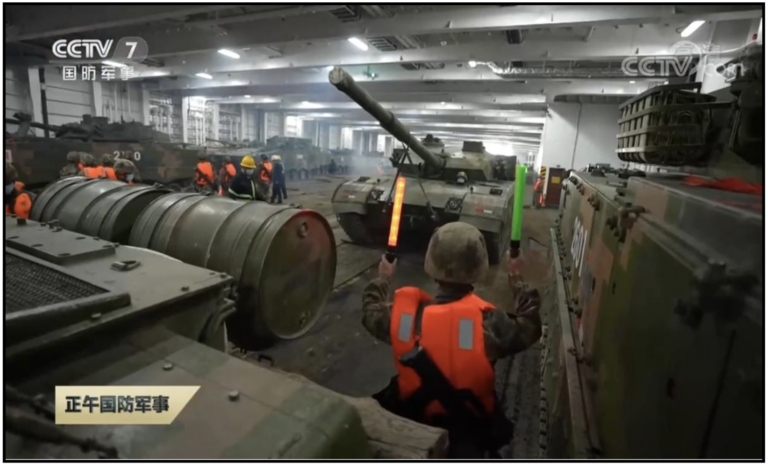In late October, the Vatican announced that it has renewed a secretive deal with the People’s Republic of China (PRC) allowing Chinese Catholics to contribute to the selection of bishops. The agreement—mired in controversy since its initial signing in 2018—has been interpreted as a sign of warming relations between the communist country and the Holy See. This development has raised alarms in Taiwan, which counts the Vatican as one of its few remaining diplomatic allies. While the Taiwan-Holy See alliance brings few material benefits to either partner, its symbolic and moral importance have grown in recent years. As Taiwan faces an increasingly aggressive China, the possibility of losing its only diplomatic partner in Europe is again raising concerns in Taipei.
Over the past two decades, Taiwan has watched as China has systematically peeled away ally after ally. Once recognized as the sole representative of China, the Republic of China (ROC) has found itself increasingly marginalized diplomatically. Among its shrinking list of remaining allies, the Vatican is something of an outlier. While the rest of Europe switched its recognition to the PRC in the 1970s, the Holy See has remained steadfastly in Taiwan’s camp. The Vatican’s status as an outlier on this issue has only grown more pronounced in recent years, as Italy—which wholly surrounds the city-state—has emerged as one of China’s most reliable partners on the continent. In recent years, as the PRC has worked to establish its influence in Rome, the Vatican has increasingly found itself the target of political and diplomatic pressure from Beijing. In turn, this pressure is part of larger Chinese efforts to build ties with Southern Europe and further diminish Taiwan’s diplomatic space. Now, the renewal of the PRC-Vatican deal threatens to upset the idiosyncratic relationship between Taiwan and the Holy See, casting doubt on the durability of Taiwan’s last foothold in Europe. If the island democracy is to maintain its final bastion of support on the continent, it must be proactive diplomatically, strengthening its relations with the Holy See while demonstrating its credentials as a model of religious freedom.
Taiwan-Vatican Relations
In many regards, Taiwan’s relationship with the Vatican is unique among the island democracy’s dwindling diplomatic relations. Since the establishment of formal diplomatic relations between the two in 1942, the association has weathered a wide array of ecclesiastical and diplomatic challenges, primarily imposed by the PRC.
Initially, the Vatican approached the ROC as it would any other normal diplomatic partner, establishing a mission and appointing a nuncio, or Papal diplomat, in 1942. [1] However, this state of affairs was thrown into disarray following the conclusion of the Chinese Civil War in 1949, when the ROC government relocated to Taiwan. The Holy See, despite its efforts to establish relations with the new, communist regime, soon found itself a target of suspicion by Mao Zedong (毛澤東) and his government. Unable to make in-roads in Beijing, the Vatican relocated its mission to Taipei in 1952, beginning decades of tension between the PRC and the Pope. [2]
Unlike Taipei’s other diplomatic partners, such as Nicaragua or the Marshall Islands, the Holy See’s recognition of Taiwan is not necessarily wholly motivated by moralistic rejections of Chinese authoritarianism or long-standing economic relations. Instead, it is primarily a function of the Vatican’s chilly relationship with the PRC. Unable to maintain an official embassy in Beijing due to Chinese distrust of religious institutions—particularly those originating in the West—the Vatican was effectively forced into continuing its relations with the ROC in Taiwan. In several regards, the Holy See’s modern relationship with Taiwan reflects this unorthodox arrangement, as the Papacy has continually demonstrated a reluctance to fully engage with its distant partner. Rather than appointing a nuncio to run its mission in Taipei, the Vatican has instead given its representative the lesser title of chargé d’affaires. Furthermore, the Holy See has steadfastly avoided sending high-level delegations to Taiwan, as no Pope has ever set foot on the island democracy.
Despite this uneasy dynamic, relations between Taiwan and the Vatican remain strong. Determined to preserve its foothold on the European continent, Taipei has frequently demonstrated its commitment to the city-state. To this end, Taiwan has maintained a fully-staffed embassy to the Holy See in Rome. Additionally, two Taiwanese presidents have visited the Holy See for official events, where they continue to act as formal representatives of China. In 2018, then-Vice President Chen Chien-jen (陳建仁) visited the Vatican to shore up diplomatic relations following the announcement of the initial agreement. More recently, Taipei and the Vatican have partnered to dispatch aid to regions devastated by the COVID-19 pandemic, with the Holy See helping to distribute Taiwan-manufactured medical supplies.
PRC-Vatican Relations
By contrast, relations between the People’s Republic of China (PRC) and the Vatican have long been defined by distrust and uncertainty. Following its seizure of power in 1949, the Communist Party swiftly set about eliminating undue Western influence. Following the execution in 1951 of an Italian citizen for allegedly conspiring to assassinate the Chinese leader, the Vatican’s representative office in Beijing was shuttered and all Papal officials were forced to leave the country. [3] This incident marred the relationship between the two for decades to come.
In keeping with its long-held distrust of religion and religious institutions—particularly those originating in the West—the PRC has kept the Holy See at arm’s length for much of the past 70 years. Fearful of the destabilizing effects of outside influence, Beijing has generally worked to limit the spread of Catholicism within its borders while simultaneously keeping a watchful eye over existing Catholics. To this end, the PRC established the Chinese Patriotic Catholic Association (CPCA, 中國天主教愛國會), a government-run religious body overseen by the United Front Work Department. Unrecognized by the Catholic Church, the CPCA is widely seen as yet another tool employed by the PRC to control, mobilize, and suppress dissent within its population.
Despite Beijing’s efforts to consolidate its control over the Church in China, many Chinese Catholics have chosen to practice their religion in secret. Indeed, millions of Catholics have opted to worship in private, operating small, unsanctioned churches. These “underground churches” (地下教會) generally look to the Vatican for guidance, viewing the CPCA as fundamentally illegitimate and even heretical. In recent years, as the Xi Jinping (習近平) regime has ratcheted up its suppression of religious minorities, these churches have been increasingly targeted by Chinese authorities.
The 2018 Bishop Agreement
In spite of China’s general intolerance of religion and poor treatment of its Catholic minority, the Vatican has continued to seek stronger relations with the PRC. Ostensibly driven by a desire to protect China’s Catholics, the Holy See has repeatedly attempted to broker deals with the communist regime. The 2018 China-Vatican deal was ultimately the product of these efforts. Initially hailed as a “landmark achievement in advancing religious freedom within China,” the agreement allowed Beijing to nominate bishops for the Pope to approve. While seemingly benign, this arrangement nevertheless allows the PRC to control the process, exclusively recommending party loyalists for crucial religious posts. Consequently, the agreement effectively strengthens Beijing’s efforts to consolidate its hold on the Church.
In addition to these domestic benefits, the deal also represents a foreign policy victory for Beijing. As Raymond Tai Rui-ming (戴瑞明), Taipei’s ambassador to the Holy See from 1996-2004, has claimed, the PRC has long insisted on two preconditions for establishing diplomatic ties with the Vatican: “the Holy See should cut relations with Taiwan and the Holy See should not interfere with China’s internal affairs.” While the agreement does not expressly state that the Vatican will switch its recognition from Taiwan to the PRC, it will nonetheless likely be seen by Beijing as a step in the right direction.
Despite Pope Francis’ intentions, the deal with China has been widely criticized as naïve, counterproductive, and ultimately dangerous. Though the agreement appears on its surface to be mutually beneficial, it is a far greater boon for Beijing, conferring prestige and legitimacy to a regime which has earned neither. According to Sean King, a policy expert who wrote about this issue in the Global Taiwan Brief soon after the signing of the original agreement, the Pope’s myopic focus on gaining access to China’s vast population will likely only alienate the underground Catholics he is seeking to protect. [4] This view has even been echoed by prominent individuals associated with the Church, such as former Bishop of Hong Kong Joseph Zen, who framed the deal as a misguided act of appeasement. Over the two years since the original agreement was signed, the PRC has only grown bolder in its repression of religious minorities, as demonstrated by its treatment of Uyghur Muslims in Xinjiang. By renewing the Vatican’s deal with such a regime, Pope Francis has demonstrated a continued willingness to place political considerations ahead of moral judgements. For the millions of Chinese Catholics operating in the shadows, it is nothing less than a stab in the back, according to Zen.
Implications for Taiwan
Aside from its clear implications for Chinese Catholics, the China-Vatican deal could potentially have a number of negative consequences for Taiwan. As King pointed out in his 2018 article, the Holy See is “by far the most high-profile of Taipei’s […] diplomatic allies.” Despite its tiny size, the city-state is Taiwan’s last remaining bastion in Europe, an island of support surrounded on all sides by one of China’s staunchest partners. For this reason alone, the China-Vatican deal should concern Taipei deeply.
Following the signing of the original deal, numerous commentators—including King—opined that it was the beginning of the end for Taiwan’s alliance with the Holy See. While the past two years have demonstrated that these concerns were somewhat exaggerated, Taipei should not grow complacent. As this month’s renewal of the deal makes clear, Pope Francis fully intends to continue to pursue expanded ties with Beijing. Given the PRC’s preconditions for true diplomatic engagement, it is hard not to view the deal as a worrying step towards a switch in recognition. Though such a momentous shift is unlikely in the near-term—as King argues—the likelihood will only grow as PRC-Holy See ties expand. [5]
For Taiwan, the renewal of the China-Vatican deal should be deeply worrisome. Though Taipei’s partnership with the Holy See may have limited economic value, its symbolic resonance cannot be ignored. As Beijing continues its campaign to peel away Taiwan’s last remaining allies, the island-democracy should not stand still. Instead, Taipei should work to strengthen its relationship with the Holy See by expanding cooperative efforts on COVID-19 relief and continuing to maintain an active diplomatic presence in Rome. Furthermore, Taiwan should work to draw a contrast between itself and the PRC, framing the matter as a choice between democratic tolerance and authoritarian repression. Taiwan is a model of religious pluralism in the shadow of China, a monolithic autocracy bent on stamping out dissent of any kind. While Taipei can do little to change Pope Francis’ mind if it is already made up, it should take whatever measures necessary to ensure that the Holy See is aware of the sacrifice it would be making.
(The author would like to thank Sean King for his comments.)
The main point: The renewal of the secretive 2018 China-Vatican agreement may be a prelude to the end of the Taiwan-Holy See alliance. While a diplomatic shift may remain distant, Taipei should proactively work to improve its crucial relationship with the Papacy.
[1] Leung, Beatrice (2009). Sino-Vatican Relations: Problems in Conflicting Authority, 1976-1986. Cambridge University Press.
[2] Ibid.
[3] Ibid.
[4] Conversation with Sean King on October 26, 2020.
[5] Ibid.



